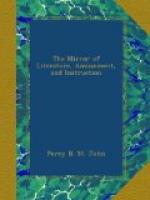Tempora mutantur et nos mutamur in illis.
The times are changed and we are changed
in them.
By the historie of the swine (which by the permission of God, were vexed by the divell) we be secretly admonished that they which spend their lives in pleasures and deliciousnesse, such belly-gods as the world hath many in these daies, that live like swine, shall one day be made a prey for the divell; for seeing they will not be the temple of God, and the house of the Holy Ghost, they must of necessitie be the habitation of the divell. Such swine, sayth one, be they that make their paradise in this world, and that dissemble their vices, lest they should bee deprived of their worldly goods.
* * * * *
OLD POETS
* * * * *
[The author of the following stanzas is JOHN BYROM, an ingenious poet, famous also as the inventor of a System of Stenography. He was born in 1691, and died in 1763. Byrom wrote poetry, or rather verse, with extraordinary facility. His pastoral, entitled “Colin and Phoebe,” first published in the “Spectator,” when the author was quite young, has been much admired. As literary curiosities, his poems are too interesting to be neglected; and their oddity well entitles them to the room they fill. The following poem is perfectly in the manner of Elizabeth’s age; and we have selected it as a seasonable dish for the present number—trusting that its rich vein of humour may find a kindred flow in the hearts of our readers.]
CARELESS CONTENT.
I am content, I do not care,
Wag as it will the world for
me;
When fuss and fret was all my fare,
I got no ground as I could
see:
So when away my caring went,
I counted cost, and was content.
With more of thanks and less of thought,
I strive to make my matters
meet;
To seek what ancient sages sought,
Physic and food in sour and
sweet:
To take what passes in good part,
And keep the hiccups from the heart.




